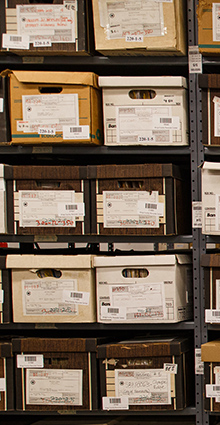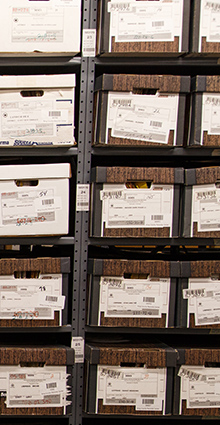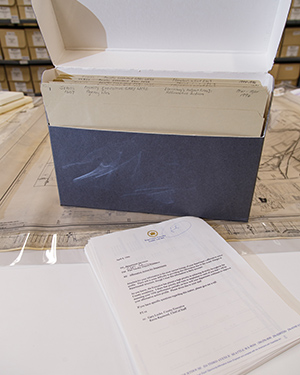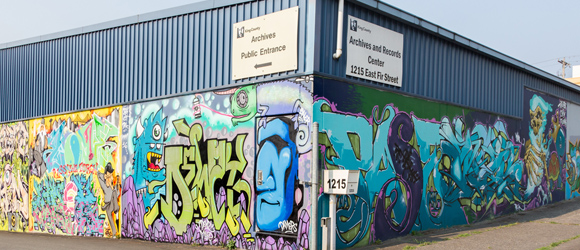About King County Archives
Mission
The mission of King County Archives is to collect, preserve, and facilitate access to County government records of enduring historical and legal value for the benefit of the public we serve.
Vision
King County Archives is a recognized leader in helping the public access County government records, learn more about the history of King County, and foster a strong connection to community.
Danielle Coyle
Assistant Archivist
Email Danielle
Phone: (206) 263-0920
Alycia Ensminger
Education and Outreach Specialist
Email Alycia
Phone: (206) 848-0928
Greg Lange
Reference Historian
Email Greg
Phone: (206) 263-2479
Karisa O'Hara
Accessibility and Office Coordinator
Email Karisa
Phone: (206) 263-2481
Hannah Soukup
County Archivist and Archives Program Manager
Email Hannah
Phone: (206) 477-5281
Tasia Williams
Assistant Archivist
Email Tasia
Phone: (206) 848-0957
History
Prior to the establishment of King County Archives, the County’s historically relevant records were transferred to and held by the Washington State Archives Puget Sound Regional Branch in Bellevue. The Regional Archives still holds some County records including the Assessor’s Real Property Record Cards, Metro records, and County Executive files.

1988: The National Archives National Historical Publication and Records Commission awarded King County government a grant to fund staff and services to “preserve, arrange, describe and make accessible” King County government archival records. (King County Department of Executive Administration, Section 7, Appendix 4, NHPRC Grant, circa 1985)
1993: King County Council established a fully funded county archives program “[p]reserving and providing public access to the archival records of King County…having continuing historical value” and designated a new position of King County Archivist. (King County Council Ordinance 10098, January 1993) Since 1988, King County’s archival records have been housed and made publicly available at 1215 E. Fir Street.
2019: King County government sold an adjoining parcel to fund an extensive remodel of the Archives building.
2022: After the renovation was complete, staff moved records stored off-site back into the building.
Written by Reference Historian Greg Lange.

King County permitting records. Photo Credit: Matthew S. Browning.

King County Executive Gary Locke's agency records. Photo Credit: Matthew S. Browning.
Records
King County Archives holds historically-relevant King County government records, and we are charged with the preservation of and access to those records. We preserve more than 300 collections comprising over 18,000 linear feet of records dating from 1853 to the present.
These records serve as a permanent source of information about activities, programs, and decisions of County agencies, elected officials, and County employees. The records exist in many formats, including paper, photographs, maps, and audio-visual materials.
Records include legislation--County Commissioner's resolutions (1853-1968) and County Council ordinances and motions (1969-1999)--a set of more than 6,000 County documents, administration and policy decisions, early road and bridge establishment and inspection records and records and policies from each former County Executives.
King County Archives shares King County government's strong commitment to equity and social justice. The county's diversity, equity, and inclusion [DEI] values guide and shape our work. We are:
Inclusive and collaborative
Staff serve on the Records and Licensing Division's ESJ team.
Staff serve on the Anti-Racist White Action Group.
King County Records and Licensing Division ESJ logo.
Diverse and people focused
Home to the Records and Licensing Division's ESJ lending library.
Staff attend trainings on creating ADA-compliant documents, building gender-inclusive spaces, and implementing ESJ fundamentals.
Responsive and adaptive
After a two-year building renovation, staff accelerated their move back into the building so we could open to the public.
Implemented a no-charge policy for patrons requesting scans of uncertified county records.
Transparent and accountable
Staff collaborates with the county Office of Equity and Social Justice to conduct accessibility audits of the Archives building.
Staff process reference and duplication requests in the order in which they were received.
Racially just
Includes a diverse selection of County employees on its interview panels.
Partners with University of Washington student researchers to uncover racial restrictive covenants.
King County Archives is committed to protecting your privacy while enabling your access to King County government records. The Archives uses data you provide for statistical purposes to improve our services, protect the security of the archival records in our custody, and to allow you to keep track of previous research activities, generate citations, and plan future visits.
We do not sell your personal data to any other organizations. We will only share your personal data and research activities for the following purposes: as required by law, such as a Public Records Act request, as part of a legal proceeding, or as otherwise authorized by you.
Access
King County Archives holds historically-relevant county government records for long-term preservation and access. Archival records are unique materials that cannot be replaced. King County Archives is charged with the care of these records for future generations. We hold them in trust for the people of King County, and we are committed to providing open access to records unless they contain information that is exempted under the Washington State Public Records Act.
Physical Access
Researchers who are requesting access to materials in person will be asked to abide by the following policies:
- Records must be accessed at the Archives building only. Archival records don't leave the premises except with the express permission of the King County Archivist.
- Please check in with staff member at the lobby desk. They are there to assist you.
- All patrons will be asked to sign in at the front desk prior to using archival records. The Archives uses only anonymized data you provide for statistical purposes to improve our services and track the use of our collections.
- No food or drinks may be consumed near archival materials. We provide lockers for you to store these items.
- The use of pens or other permanent marking tools is prohibited while using archival records. Such items can damage or deface historical materials.
- Patrons using the research room will be asked to store their bags and coats in a locker outside the research room.
- Duplication of archival materials is facilitated by Archives staff.
Remote Access
King County Archives is committed to providing a meaningful remote research experience for patron who are unable to visit in person. Although materials cannot leave the building or loaned, patrons can contact us via email or phone and request a research consultation. An Archives staff member will discuss your research topic with you, and make recommendations about what records in our holdings may be responsive. If information isn't available in our holdings, Archives staff will do their best to refer you to the office or agency that may hold responsive records.
King County Archives also provide duplication services. Please review our Duplication and Publication Policy.
Publication of County government records held by King County Archives does not require permission or a use fee. We ask that you properly cite any materials in our holdings (see below for citation example) that you use in publication. Please note that there are some restrictions on the duplication and publication of government records.
Government Records and Fair Use
Most works created by King County government, including documents prepared by an officer or employee of the county government as part of that person’s official duties, may be freely copied, published, edited, and adapted.
The right to duplicate King County government-created works without permission generally does not extend to:
- works created or published by others with the support of King County government funds, grants, or contracts;
- versions of government documents that are edited, annotated, or compiled by publishers; and
- portions of government documents that contain copyrighted material from other non-King County government sources.
King County Archives does not claim to control the rights of reproduction for all materials in its collection. In those cases where a person or legal entity other than King County holds copyright to certain content present in King County Archives holdings, the publishing party assumes all responsibility for clearing production rights with the copyright holder and for any infringement of U.S. copyright law (Title 17, U.S. Code).
Washington State Public Records Act
In Washington State, laws exist to ensure that government is open, and that the public has a right to access appropriate records and information created by Washington state and local government. The Public Records Act states:
"Each agency, in accordance with published rules, shall make available for public inspection and copying all public records, unless the record falls within the specific exemptions of subsection (6) of this section [RCW 42.56.070(6)], Chapter 42.56 RCW, or other statute which exempts or prohibits disclosure of specific information or records."
To the extent required to prevent an unreasonable invasion of personal privacy interests protected by Chapter 42.56 RCW, an agency shall delete identifying details in a manner consistent with Chapter 42.56 RCW when it makes available or publishes any public record; however, in each case, the justification for the deletion shall be explained fully in writing.
Other exceptions to the Public Records Act include the Health Insurance Portability and Accountability Act of 1996 (HIPAA) and The Family Educational Rights and Privacy Act (FERPA). HIPAA is a federal law requiring the creation of national standards to protect sensitive patient health information from being disclosed without the patient's consent or knowledge. FERPA was enacted in 1974 to protect the privacy of student education records.
Duplication Exceptions
King County Archives reserves the right to deny duplication of the materials in its holdings due to the following:
- A violation of federal or state privacy laws.
- A violation of federal or state copyright laws.
- Fragility of materials or damage to materials resulting from duplication.
Citation / Credit
The Researcher agrees to use the following credit line, or one in a similar format that has been approved by King County Archives, when publishing or using in facsimile reproduction the material(s) identified below.
[Folder / Volume Title] OR Photo [number], [Collection / Series title], Series / Collection [number], Box / Volume [number]. King County Archives, Seattle, Washington.
King County Archives collects records created by King County government departments and King County employees working in their official capacity for the county. We cannot accept donations of materials created by non-county employees, county employees not in their official capacity working for the county, or private businesses and organizations. If you have questions about the historical value of your records and what repository might be appropriate, please contact the King County Archivist for a referral.
Duplication Fees
Starting September 1, 2022, King County Archives no longer charges duplication fees for uncertified copies of recorded documents dated before August 1991 and not available online through the King County Recorder’s Office.
Why Stop Charging Duplication Fees?
Unlike Recorder’s and Auditor’s offices in Washington State, King County Archives is not required by law to charge for uncertified copies of recorded documents. We are discontinuing charging for the following reasons:
- King County Archives places a high value on equity and social justice. Fees disadvantage members of the public who can’t afford to pay. Charging fees also creates an assumption that people who request access to public records can afford to pay for access.
- King County Archives places a high value on enhancing patron access. We are working to increase public access to public records.
- King County Archives places a high value to streamlining its procedures to ensure the office is working most efficiently to serve the public. Not charging eliminates the work of invoicing patrons and processing payments.
- This change aligns with how the county processes public records requests, which is to fulfill them without charging.
King County Archives no longer charges for uncertified copies of recorded documents dated prior to August 1991 or not already available on Landmark.
The Archives is still required by Washington State law to charge for certified copies of recorded documents. The Recorder’s Office is required by law to charge for uncertified and certified copies of recorded documents.
No fees for uncertified copies of recorded documents only applies to those documents recorded prior to August 1991 and documents not already scanned and available on Landmark such as plats, surveys, and other maps.
Patrons requesting uncertified copies of recorded documents that are not available on Landmark will experience reduced wait times for document delivery. You won’t have to wait for an invoice and payment processing before receiving your order.
Patrons who previously paid for uncertified copies will not be refunded for those copies. However, they will not be charged for subsequent orders of uncertified copies.
Why eliminate fees?
King County Archives is not legally required to charge fees for uncertified copies of recorded documents. We've taken this step to increase access to the records that we hold in trust for the people of King County.
What are the goals for this change?
This change will reduce wait times for document delivery and increase equitable patron access to public records.
How will you know if the goals are achieved?
The Archives will track the impacts of this change by monitoring our response times to patron requests for copies. We will solicit patron feedback about this new process. This process will also inform Archives initiatives for increased access to other public records.
Without fees, won’t people just ask for copies of all records at the Archives?
There is a common misconception that removing fees will encourage people to request multiple copies of public records regardless of whether they need them. Most patrons know what records they want and would order them even if we charge fees. However, charging creates barriers for patrons who need access to the records but can’t afford to pay or are unable to visit the Archives in person.
The Archives is committed to providing equitable access to public records, and we employ a variety of methods to do so. In addition to scanning materials on patron request, we also have a public lobby and research room so anyone may view records in person. We identify and digitize record groups to make available online, and we process archival records so that they’re easier for members of the public to search.
How will eliminating fees impact the Archives budget?
The fees collected by King County Archives for providing copies of recorded documents don’t come to the Archives, so we don’t directly benefit from them. Fees for copies of recorded documents are put into King County government’s general fund and represent a very small part of the budget. Fees are also not a reliable source of revenue.
What Documents Does the Archives Charge for?
King County Archives is required by Revised Code of WA Auditor's Fees RCW 36.18.010 to charge for certified copies of recorded documents and marriage certificates.
A recorded document is any document that is officially recorded by the County Auditor or County Recorder. Documents recorded before 1970 were recorded by the King County Auditor. With the adoption of the 1969 Charter, the Auditor’s Office was abolished, and its duties were transferred to the newly created Recorder's Office. The King County Recorder’s Office is charged with recording documents such as real estate deeds, mortgages, plats, surveys, and register land (Torrens).
What recorded documents does the Archives have?
King County Archives holds the original recorded documents that were created prior to August 1991. These include property records such as deeds, short plats, and easements. They also include military discharge (DD-214) records. We hold microfilmed copies of those documents for public access.
How does the Archives make recorded documents available?
The Archives makes microfilmed copies of the records in our holdings available to the public, who may access the microfilm in person during open building hours. We also scan recorded documents from the microfilm by request for Archives patrons.
What recorded documents does the Recorder's Office hold?
The Recorder’s Office holds the original recorded documents that were created from August 1, 1991 to the present. The Recorder’s Office is required by Revised Code of WA Auditor's Fees RCW 36.18.010 to charge for both certified and uncertified copies of recorded documents.
How does the Recorder’s Office make documents available?
The Recorder’s Office makes the documents in their holdings available through their online portal Landmark. They also make surveys, maps, and plats from 1853 to the present available on Landmark. You may order certified and uncertified copies directly through Landmark, and the Recorder's Office will fill your order. You may also print a free, watermarked version of any records on Landmark.
This section contains frequently asked questions and answers about King County Archives. If you don't see the answer to your question listed below, please email us at archives@kingcounty.gov or call (206) 263-2480 for more information.
King County Archives holds records created by King County government departments and employees working in their official capacity for the county. These records are available in many formats including paper, photographs, maps, audio, and visual. They include the following: legislative records such as County Commissioners resolutions (1853-1968) and County Council ordinances and motions (1969-1999); pre-1969 Charter legislation; administration and policy decisions; recorded documents related to property ownership; early road and bridge establishment and inspection records; and records and policies created by former County Executives.
- With the adoption of the 1969 Charter, King County changed its form of government and created new county agencies. The county's records, formerly held in a more central manner, were dispersed among those agencies.
- King County Archives was not established until 1990. Prior to that, Puget Sound Regional Archives in Bellevue was the official repository for King County. As a branch of the Washington State Archives, Puget Sound Regional Archives still retains some King County records, such as pre-1990 tax assessment records, property assessment records, and historical house photographs.
- Some county offices, such as the Sheriff, Superior and District Courts, and certain departments within Public Health, maintain their own records because they need to reference them frequently or because those documents contain sensitive information like social security numbers, medical history, etc. that by law must be restricted.
You may access records held at King County Archives remotely or in person.
- To request remote assistance, please email archives@kingcounty.gov or call (206) 263-2480.
- To access records in person, please to to the Visit the Archives page for more information. Most recorded documents are available in our microfilm research room, where no appointment is required. The bulk of the archival records in our holdings are not available on microfilm, so if you wish to access those, please contact us to schedule a research appointment.
- Archival records held by King County Archives do not circulate and may not leave the facility. We hold these records in trust for the people of the county, so that they may be available for future generations. You are welcome to visit the Archives in person to access the records. If you cannot visit in person, please email archives@kingcounty.gov or call (206) 263-2480 about alternative access options.
Whether you need an appointment depends on the types of records you'd like to access.
- For recorded documents on microfilm, you don't need an appointment and may visit the Archives building during our open walk-in hours. Go to our Visit the Archives page for more information.
- For archival records not on microfilm, we ask that you make an appointment. This gives us time to do a research consultation if necessary, locate potentially responsive records, and have them ready when you arrive. Call (206) 263-2480 or email archives@kingcounty.gov to schedule an appointment.
- We encourage visitors to bring their personal laptop, mobile device, or digital camera so they may take notes and digital images of materials.
- For more information on appointments, building hours, and directions to the Archives, please go to the Visit the Archives page.
The King County Archives building is located at 1215 E. Fir Street, Seattle, WA 98122. For directions and parking information, please go to the Visit the Archives page.
There are several sources of property and land use records in King County, including:
- The King County Permitting Division holds construction and land use records, including permits, for properties in unincorporated King County.
- The King County Department of Assessments holds current property tax assessment records.
- Puget Sound Regional Archives in Bellevue holds historical tax assessment records. The Regional Archives is a branch of the Washington State Archives.
- Recorded Documents: Please fill out our online order form.
- Other Archival Records: Email archives@kingcounty.gov or call (206) 263-2480. Please provide a brief description of the records you want and where they're located in the Archives: which series, record group or box number. If you don't have that information, we are happy to provide a research consultation to determine whether we hold records that may be responsive to your research.
- Marriage Certificates: If your marriage certificate was filed before 1990, you may order a certified, downloadable copy on the Washington State Digital Archives. If your marriage certificate was filed in 1990 or later, you may order a certified copy on the King County Recorder's Office online portal Landmark.
- Except for special formats or very fragile items, King County Archives does not charge for duplication of uncertified copies of county records.
- We charge a fee for certified copies of recorded documents and marriage certificates in accordance with the Revised Code of WA Auditor's Fees RCW 36.18.010.
- For fragile items or special formats such as video, audio, or large-format documents, please consult with the County Archivist as these may need to be duplicated by a specialist.
- For more information about fees, please visit our Copy Fees page.
- King County Archives does not charge any use or publication fees. Except for very specific types of records, government records are considered part of the public domain, and therefore, not subject to copyright restrictions.
- For more information about use of government records, please review the Policies section of this page.
- No. Most works created by King County government, including documents prepared by an officer or employee of the county government as part of that person’s official duties, may be freely copied, published, edited, and adapted.
- For more information about publication of government records, please review the Policies section of this page.
- King County Archives requests that you cite the records in our holdings.
- Citations helps others find those records if they want to do further research.
- Please use the following citation template: [Folder / Volume Title] OR Photo [number], [Collection / Series title], Series / Collection [number], Box / Volume [number]. King County Archives, Seattle, Washington..
TTY Relay 711
Phone / Email Hours
Monday to Friday, 9 am - 4 pm
Walk-in Lobby Hours
Tuesday and Wednesday, 10 am - 3 pm

 Translate
Translate

